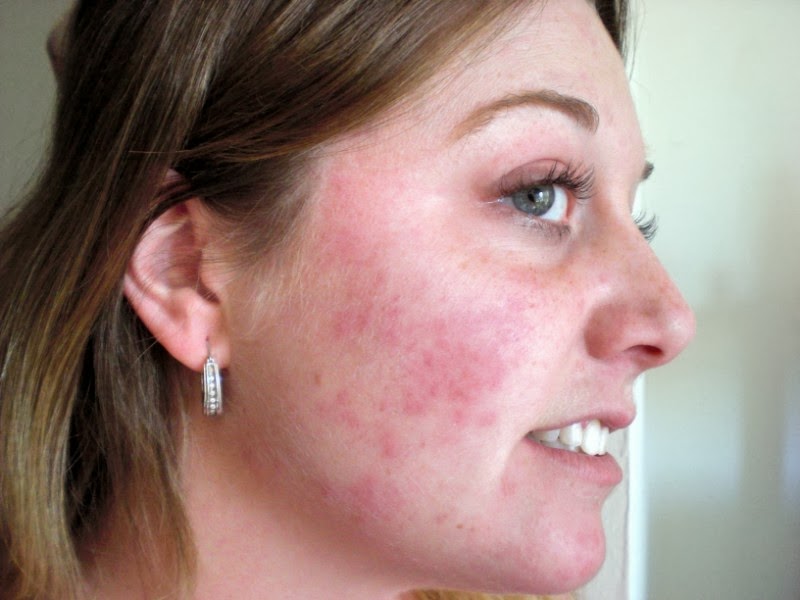If you woke up with a swollen, puffy face, it might be the result of excess pressure on your face when sleeping. But what if you look in the mirror and realize that you have rash at the same time? It should raise an alarm. The combination of swelling and a rash can indicate that you have an underlying medical condition. Because of this, you should consult your doctor for proper diagnosis and treatment.

What Can a Swollen Face and Rash Indicate?
The symptoms could indicate an allergic reaction or eczema. But do not make this conclusion on your own. Consult your doctor for assistance.
1. Allergic Reaction
This arises when your body’s immune system incorrectly assumes a harmless substance to be a hazardous invader. Some of the common triggers of an allergic reaction include:
- Allergens from air, such as animal dander, pollen, mold, and dust mites
- Foods, such as milk, peanuts, wheat, tree nuts, soy, eggs, fish, and shellfish
- Insect stings like wasp stings or bee stings
- Medications, such as penicillin
- Latex or substances that cause allergic reactions on touching
Sometimes, the reaction might become more severe and lead to anaphylactic shock which can be fatal. Anaphylaxis and anaphylactic shock may present with the following symptoms:
- Swollen face and rash
- Swelling in the throat
- Swallowing or breathing problems
- Hives
- Swollen limbs
- Confusion or anxiety
- Coughing
- Wheezing
- Dizziness
- Lightheadedness
- Nasal congestion
- Heart palpitations or irregular heartbeat
- Slurred speech
In case your condition includes some of the symptoms of anaphylaxis, seek emergency medical help.
2. Eczema
Eczema can appear in the form of a swollen face and rash, but is normally characterized by an itchy, dry rash. On scratching, the skin usually oozes and crusts over. If you continue to scratch for a long time, the skin tends to become thick and dark. Eczema often appears on the face and is generally believed to emerge as a result of a combination of environmental and hereditary factors.
Children with a history of eczema in the family have more chances of developing the condition. If both parents are suffering from the condition, the chances are even higher. The common environmental factors that contribute to the development of eczema symptoms include:
- Irritants – Shampoos, detergents, and disinfectants
- Allergens – Pets, dust mites, dandruff, pollens, and molds
- Microbes – Viruses, bacteria such as Staphylococcus aureus, or some fungi
- Changing temperatures – Perspiration from activity, high and low humidity, and hot weather
- Foods – Wheat, nuts and seeds, dairy products, soy products, and eggs
- Stress – It contributes to an increase in the symptoms.
- Hormones – The symptoms of eczema tend to change with hormone levels. They worsen during pregnancy and at times within the menstrual cycle.
How Can Swollen Face and Rash Be Treated?
1. Allergic Reaction
Common allergy treatments include:
- Emergency epinephrine: This is a kind of shot provided by doctors to people who experience severe allergies that cannot otherwise be treated. The epinephrine injection helps to reduce symptoms and thus allow the patient to seek emergency treatment.
- Avoiding allergens: Seek the guidance of a doctor to identify, monitor and stay away from allergy triggers. Allergic reactions and their symptoms can be greatly reduced through this step.
- Medications: Doctors can recommend over-the-counter medications or subscribe specific pills or liquids, nasal sprays, and eye drops. These medications reduce the reactions of your immune system and further lessen symptoms.
- Immunotherapy: This is recommended for critical allergies or other allergies that cannot be cured by any treatment. As part of this treatment, extracts of purified allergens are injected into the patient’s body for a few years.
2. Eczema
In certain cases, eczema tends to subside over time, while in others it is a permanent condition which can sometimes present in the way of a swollen face and rash.
There is no specific cure for eczema. The doctor will generally help by treating the affected skin and preventing an increase in symptoms. Treatment is prescribed on the basis of age, symptoms and present health condition of the patient.
There are several things that an eczema patient can do to improve skin health and reduce symptoms. These include:
- Frequent warm baths
- Application of a moisturizer 3 minutes after bathing to keep the skin properly moisturized
- Wearing only cotton or soft fabric clothing
- Keeping away from scratchy fibers, and tight-fitting clothes
- Washing with non-soap cleanser or mild soap
- Avoiding rubbing a towel to dry the skin
- Avoiding situations where your body temperature changes rapidly
- Identifying and avoiding your eczema triggers
- Keeping fingernails short to avoid breaking skin while scratching
Medications to treat eczema
- Topical corticosteroid ointments or creams to immediately relieve itchiness and skin inflammation
- Systemic corticosteroids injected or consumed orally, but used for shorter durations
- Antibiotics in cases of bacterial skin infections
- Antihistamines to reduce the inflammation and the accompanying itchiness
- Topical calcineurin inhibitors to suppress immune system reactions and inflammation
- Barrier repair moisturizers to heal the affected skin
- Phototherapy using ultraviolet waves to treat moderate dermatitis
While there is no cure if the swollen face and rash arise due to eczema, a treatment plan can be developed for every patient. Note that you should take care of the affected skin even after healing to prevent future irritation.
